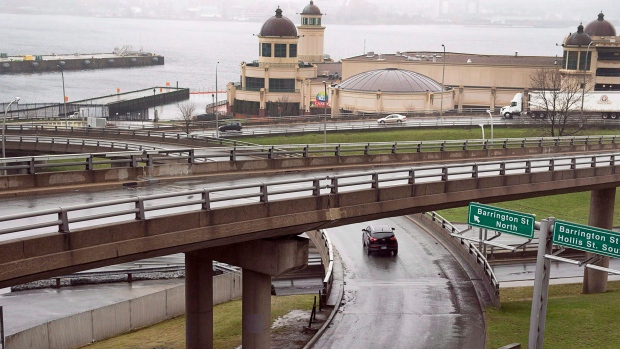Jun 14, 2018
Halifax tops Toronto, at least for nixing downtown expressways
, Bloomberg News

Canada’s maritime city of Halifax is succeeding where Toronto has failed: tearing down an eyesore of an expressway in the heart of downtown and replacing it with condos, parks and bike paths.
The demolition of the Cogswell Interchange, a 50-year-old multi-level highway that cuts off parts of the city from the Altantic Ocean, is part of an ambitious overhaul of the port city that’s attracted companies like International Business Machines Corp. and even put in a bid for Amazon.com Inc.’s second headquarters.
“I always felt the one thing we missed was a bit of ambition and I just don’t think you can stay a comfortably, small or mid-sized city anymore,” said Halifax Mayor Mike Savage, in an interview from Bloomberg’s Toronto office. “You’re like a company. If you don’t grow, you don’t prosper.”
By scrapping the jumble of overpasses and underpasses and redeveloping the area, Halifax joins cities like Boston and San Francisco that have removed the decades-old infrastructure to make their downtowns more inviting. That contrasts with Toronto, Canada’s biggest city, which has been debating for years about what to do with the elevated Gardiner Expressway, which separates the city’s financial and entertainment districts from the waterfront of Lake Ontario.
Proponents say the roughly 18-kilometre (11-mile) highway in Toronto is needed for traffic flows, while others want it demolished. For now, the aging green-steel structure remains, with the city approving a plan to rebuild only the eastern part of the highway.
Bike Lanes
So far, Nova Scotia’s capital has plans to invest about $90 million to dismantle the interchange over the next three years, Savage said. The plan is to connect the waterfront to downtown and build a mixed community of residential and commercial development with bike lanes, green spaces and more.
“The big concrete monstrosity thing, it’s in the heart of our city, we’re going to plan to take that down,” Savage said. “I want to do it in a way that doesn’t just bring the city to a halt for 10 years, so we’re trying to do it in stages.”
Halifax, Canada’s 12th-largest city, has designed a mitigation plan to allow traffic to keep flowing during construction, said Jacques Dubé, chief administrative officer for the city. The Cogswell plan includes nine high-rise towers that may house as many 2,500 residents, he said. Demolition is set to begin next year.
Though the housing market in Halifax is nowhere near as pricey as Toronto or Vancouver, the east-coast city with a population of about 435,000 is starting to see more demand as it gains interest from global technology and financial titans. Companies like Lockheed Martin Corp. are expanding in the city to support the $60 billion federal government contract to build the country’s future naval combat fleet and other vessels. The project, led by Irving Shipbuilding Inc., has already brought on about 1,800 workers.
Housing Gains
Average home prices are still relatively low in the city at about $315,365 as of April, or about a third of the average price in Toronto, but there are signs that the market is picking up. Residential building permit values have been increasing, jumping to a 15-year high last year. And projects like Cogswell are predicted to bring in hundreds of units to the market.
“We have this huge opportunity right now, you can take a very key strategic property and make it a people place,” Dubé said. “Canada’s largest naval base is right there, and so you look at the military personnel coming in, that’ll be an ideal place for them.”

